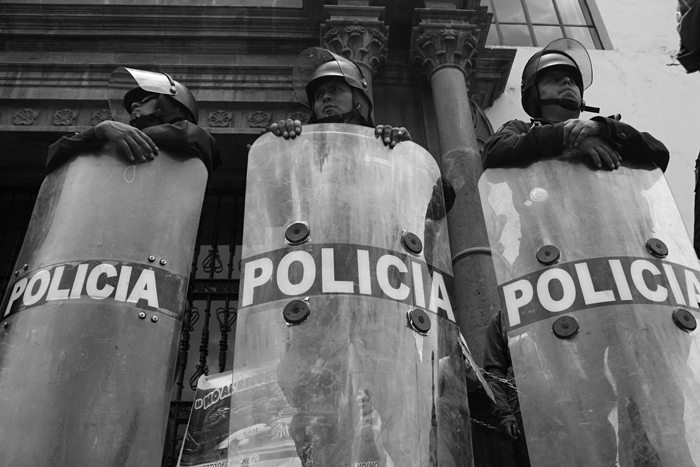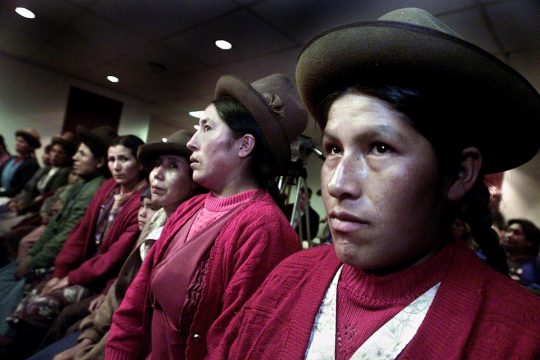In an important recent decision, the Inter-American Court of Human Rights (IACHR) affirmed that the extrajudicial execution of a member of a subversive group is a violation of the right to life and a state’s obligations under international humanitarian law. In this particular case, Eduardo Nicolás Cruz Sánchez, a member of the Tupac Amaru Revolutionary Movement (MRTA) in Peru, was captured and killed during the “Residence of the Japan’s Ambassador Hostage Crisis” of 1996-1997. The Court established that Peru was responsible for his execution and for the delay in investigating the deaths of Cruz and two other members of the group.
Affirming that people engaged in violent acts of subversion have the right to not be summarily executed after they have been captured might seem as an obvious application of international human rights law to some people. However, this is very significant, given the strong reaction that acts regarded as terrorism often provoke. Several countries including the USA, Kenya, Egypt, Tunisia and Peru have, under the guise of “law and order,” been seen to sacrifice the rule of law in favor of security obtained through repressive means. It has proven very tempting to states to use repressive policies when facing terrorism, usually with popular support, including accepting or condoning violations that have been defined as non-derogable by established conventional and customary international law.
In Cruz Sanchez, the Court decided against compensation for moral damages, which are aimed at addressing the suffering caused to the victim and his family. The decision limited reparations to rehabilitation for the victim’s brother; a full investigation of the deaths; and the Court decision itself as a form of reparation. The Court did not offer a clear justification for its decision, making it difficult to understand the reasoning behind it.
The ambiguity of the decision, which is reinforced by the lack of a clear justification, leaves room for interpretations that condone the use of methods for combating subversion and terrorism that are forbidden by international human rights law. This is why the judgement requires careful analysis in regards to two main issues: first, the requirements of the Court to order reparations, including under which conditions it is permissible to refuse to make an award of compensation for moral damages; and second, the nature of the Court’s obligation to make its reasons transparent and the consequences of its failure to do so.
Jurisprudence on reparations
The IACHR has developed a strong jurisprudence on the right of victims of human rights violations to reparations. For example, the Court has ordered investigations, criminal trials, measures to guarantee non-repetition such as legal reforms and human rights education for public servants, rehabilitation for victims, and an array of symbolic measures such as public apologies.
The right to reparations has been affirmed in all cases involving summary executions, forced disappearance, torture, or violations of that nature. One early decision clarified the importance that the Court assigns to the severity of the violation for ordering reparations, stating that:
there are numerous cases in which other international tribunals have decided that a condemnatory judgment per se constitutes adequate reparation for moral damages […]. However, it is the view of this Court that while a condemnatory judgment may in itself constitute a form of reparation and moral satisfaction, whether or not there has been recognition on the part of the State, it would not suffice in the instant case, given the extreme gravity of the violation of the right to life and of the moral suffering inflicted on the victims and their next of kin, who should be compensated on an equitable basis.[1]
The Court affirmed that the evaluation of reparations should be assessed in each case and provided a criterion, based on the severity of the violation and the suffering caused, to determine whether it was appropriate to order reparations.
In the Cruz Sánchez case there was no claim for material damages. However, the Court established that the victims’ brother, Edgar Odón Cruz Acuña, suffered a violation to his personal integrity, as the execution of his brother and subsequent search for justice provoked in him feelings of fear and defenselessness.[2] The representatives of the victims requested medical and psychological care. While there was no specific amount requested for moral damages, they did ask the Court to define them “in equity.”[3]
The question that follows is should the Court assess the victims’ previous activitiesbelonging to a subversive group or engaging in an act deemed terrorism—for awarding compensation for moral damages? In general, the Court has not considered the activities or affiliation of defendants when establishing that a violation of the Convention had been committed or for ordering reparations. It has recognized the right to reparations in cases of massacres of members of subversive groups inside prisons (Miguel Castro Castro Prison v. Peru[4] and Neira Alegría et al. v. Peru[5]), as well as in cases of torture and inhuman conditions of imprisonment of people accused or convicted of being members of subversive groups (Loayza Tamayo v. Peru[6] and Lori Berenson v. Peru[7]).
There are other examples of cases where the Court has ordered reparations but denied compensation for moral damages, such as Castillo Pretuzzi et al. v. Peru[8], which involved prolonged solitary confinement and violations of due process of law against several members of MRTA. The Court did not explain why compensation was not ordered in this case; instead, it stated that the judgment itself was a form of reparation for moral damages. In McCann et al. v. The United Kingdom[9] the European Court understood that it was not appropriate to make an award on damages in regards to the killing of three IRA members by British soldiers, as the victims were intending to plant a bomb.
Which factors, then, are to be considered in evaluating the appropriateness of compensation for moral damages in each case? Should that evaluation consist exclusively of assessing the severity of the violation committed and the consequences caused, or should it also include an evaluation of the previous conduct of the victim or the legitimacy of his or her actions?
A judgment open to interpretation
Given the lack of justification of the Court’s decision it is necessary to try alternative interpretations that derive from the judgment. The following are different possible justifications that the Court might have used and why those justifications should be rejected:
Somebody at war with the state does not deserve compensation for moral damages: Given that the Court considered that the hostage operation and the MRTA struggle was part of an internal armed conflict, it could have considered that it would be inappropriate to provide compensation for moral damages to the relatives of somebody who was at war with the state. However, once the Court declared that Cruz Sánchez suffered a violation of his right to life by being executed, and recognized that the violation caused suffering to his brother, all the jurisprudence of the Court should have resulted in the recognition of his right to compensation for that suffering. Moreover, Cruz Sánchez’s relatives were not at war with the State, and neither was the armed conflict still being fought at the time of the judgement.
The victim is unworthy of compensation of moral damages because of having committed heinous crimes: The Court considered that Cruz Sánchez had just committed a heinous crime by taking hostages, including civilians and diplomats. Therefore, the Court could have determined that the victim was unworthy of compensation for moral damages. However, the Court cannot consider the moral or criminal character of the victims in order to assess whether they deserve reparations for moral damages once it has been established that they suffered as result of a violation committed. If such proximity was irrelevant for establishing the violation, what is its relevance for compensation?
The victim exposed himself to the damage: The Court could have based its judgment on the doctrine of recklessly or intentionally exposing oneself to damage as a condition for limiting liability. According to this, a person engaged in a violent crime would have renounced his or her right to be compensated for suffering caused to him by the state’s response to those actions. However, those consequences are limited to legitimate responses by the state and its security forces. Those responses include the possibility of being arrested or killed by security agents under conditions of legality of the use of force, absolute necessity, and proportionality,[10] but not of being killed or subjected to torture or cruel or unusual punishment after having surrendered or once one is no longer posing any threat. Moreover, the immediate conduct of the victim does not make the harm suffered as a result of such a serious violation legitimate, and he or she should not be forced to tolerate that harm. Additionally, it cannot be argued that Cruz Sánchez’s brother had exposed himself to the damage.
Given the nature of the situation, a compromise was needed: Another possible interpretation is that the Court used its discretion for reaching a compromise between upholding a fundamental right and awarding reparations to a victim whose behavior may not be seen as deserving of it[11] as was raised in McCann. Nevertheless, courts need to be consistent with their own judgments instead of making compromises. There is a significant difference in assessing the justifiability of the killings in McCann and Cruz Sanchez. Those justifying the killings in McCann considered the imminent threat that the victims could detonate a bomb, while there is no evidence that Cruz Sánchez represented any form of threat at the moment of his execution.
The decision of the Court needs to be clearly stated and justified, as delineated in Article 66.1 of the American Convention. The judgment on reparations should be no exception to this rule. The provision in Article 63.1 that the Court “shall rule […] if appropriate, that fair compensation be paid to the injured party,” cannot be understood as granting it arbitrary leeway in defining when and which forms of reparations are due. It gives room for using different methods for assessing damages and defining appropriate forms of reparations, but these should be based on the examination of the violations and their consequences and be clearly justified. The fact that there is no recourse to the decisions of the Court is a compelling reason for having a clear justification of all their elements.
The importance of the Court’s jurisprudence for defining a standard for human rights is another reason for the Court to clearly justify its decisions. The reasoning of the Court can help national courts and governments comply with their obligation to respect the rights established in the American Convention and to exercise judicial review or conventional control.
The fact that this decision abandons the consistent jurisprudence of the Court makes the need for its decision to be clearly justified even more compelling. As mentioned before, the Court has affirmed the right to compensation for moral damages in cases of severe violations when it has been established that those violations caused suffering to the victim and his or her family. The Cruz Sanchez case may be more complicated; however, the exceptionality of the case requires a clear reasoning by the Court on how it reached its judgment.
The Court should affirm that the all victims of serious violations of human rights are entitled to compensation for moral damages, among other forms of reparations as a matter of general principle. It is not at all self-evident that departure from that principle would ever be legitimate or indeed would not undermine the objects and purposes of the American Convention on Human Rights.
A clear pronouncement on the Cruz Sanchez case will leave no ambiguity that states cannot justify the use of repressive methods that violate non-derogable human rights in their fight against terrorism. Every victim of a serious human rights violation should be entitled to the protection and remedies of the law, including something as basic as reparations for moral damages for the suffering caused by those violations, no matter the organizations they belonged to or their previous actions.
The Court has an obligation to fully justify its decisions in regards to reparations, especially when they differ from the general doctrine it has developed through its jurisprudence. It would also help national courts to have clear guidance on how to handle these cases and protect the rights of people accused of subversion or terrorism.
The Inter-American Court of Human Rights needs to be clear in affirming the inalienable and non-derogable nature of human rights for people accused of or involved in subversion or terrorism. Any ambiguity could be interpreted by states as support for the idea that political and public approval of the use of repressive methods can be partially condoned, or that people involved in terrorism have resigned or waived their right to be safe from human rights violations, or to their right to an effective remedy.
[1] IACtHR, El Amparo v. Venezuela (reparations and costs), judgement of September 14, 1996, series 28, para 35.
[2] IACtHR, Cruz Sánchez v. Peru (preliminary exceptions, merits, reparations and costs), judgement of April 17, 2005, series 292, para. 449-450.
[3] Ib., para. 461, 476, and 480.
[4] IACtHR, Penal Miguel Castro Castro v. Peru (merits, reparations and costs), judgement of November 25, 2006, series 160.
[5] IACtHR, Neira Alegría v. Peru (reparations and costs), judgement of September 19, 1996, series 29.
[6] IACtHR, Loayza Tamayo v. Peru (reparations and costs), judgement of November 27, 1998, series 42.
[7] IACtHR, Lori Berenson v. Peru (merits, reparations and costs), judgement of November 25, 2004, series 119.
[8] IACtHR, Castillo Petruzzi et al. v. Peru (merits, reparations and costs), judgement of May 30, 1999, series 52.
[9] ECHR, McCann and Others v. the United Kindom, Judgement of 27 September, 1995, series A no. 324.
[10] Cruz Sánchez v. Peru, para. 265.
[11] Matti Pellonpää, Individual Reparation Claims under the European Convention on Human Rights, at Albrecht Randelzhofer and Christian Toumuschat (eds.). State responsibility and the individual: reparation in instances of grave violations of human rights Marinus Nijhoff Publishers, The Hague, 1999), 113.





